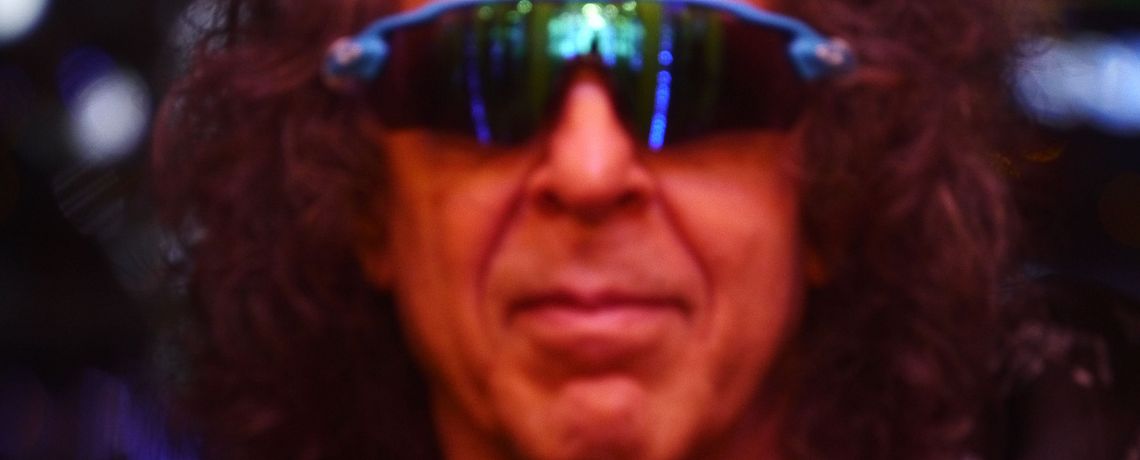MARTIN REV
MARTIN REV - out March 22, 2024
In the beginning Martin Rev‘s eponymous debut solo record was released in 1980, not long after the second Suicide LP appeared. It is one of the most seminal albums to have emerged in the early years of electronic music.
Martin Rev recalls the circumstances surrounding the creation of his solo disc: »At that time, soon after the release of the first Suicide album, Marty Thau (founder of Red Star Records) asked me if we could do a solo record. It was decided by all of us that it might be too soon, even though Marty was thinking of an instrumental album as well. I knew Charles Ball quite well - his new label Lust/Unlust had, until then, only put out singles and EPs. One night, I went into an empty CBGB's, I had a feeling that he might be there and would approach me on the idea. He was, and he came right over to me and asked me if I would make an album, his first on the label.«
The tension between his hypnotic drum machine salvoes and Alan Vega‘s irrepressibly expressive voice on stage or in the studio created an electrifying mix, and yet these six supremely minimal compositions were no less impactful without Vega’s voice.
There is an enchanting simplicity to the beautiful bubblegum melodies of the opening pieces "Mari" and "Baby Oh Baby" (the only track with a Rev vocal, everything else is instrumental). Like a clandestine heart, embedded in dissonant textures and infinite rhythm loops, echoing the doo-wop and rock 'n' roll songs at the tempestuous epicentre of New York, the place which had such a profound influence on the youthful Martin Rev, there is also an incongruousness to Rev’s own music, etched into the DNA he shares with the city.
Rev describes his perpetual fascination with this distinctive sound:
»I guess rhythm and linear ideas made with electronics are the ingredients that are always there in expressing a personal reaction to what instinctively makes music work for me. Everything experienced, learned and studied at the time of playing or recording just flows into the mix.«
Above all, there’s a sense that Suicide’s records and the solo works of Martin Rev could not be any more different to those of their European contemporaries such as Kraftwerk, Tangerine Dream or Jean-Michel Jarre. If this is music as dystopian psychedelia, it glows nevertheless with substantial warmth. Sounds grab you instantaneously and, by virtue of endless repetition, never let you go. Rev‘s 1980 debut thus offers us something of great value: an insight into the beginnings of an impressive solo career which would play such an important role in the development of successive generations of artists. It is as enthralling today as it was when it first appeared.
- Daniel Jahn, July 2023
DEUTSCHER PRESSETEXT
Am Anfang
Martin Revs erste, selbstbetitelte Soloplatte erschien 1980, kurz nach Veröffentlichung der zweiten Suicide LP und ist eines der wegweisendsten Alben früher elektronischer Musik.
»Damals, kurz nach der Veröffentlichung des ersten Suicide Albums, fragte mich Marty Thau (Gründer von Red Star Records, damaliges Label von Suicide), ob wir ein Soloalbum machen könnten. Wir waren uns alle einig, dass es dafür noch zu früh sei, obwohl Marty auch an ein Instrumentalalbum dachte. Ich kannte Charles Ball recht gut und sein neues Label Lust/Unlust hatte bisher nur Singles und EPs veröffentlicht. Als ich eines Abends in ein leeres CBGB's ging, hatte ich das Gefühl, dass er dort sein könnte und mich auf die Idee ansprechen würde. Er war da und kam direkt auf mich zu und fragte mich, ob ich ein Album machen würde, das erste auf seinem Label«, erinnert sich Martin Rev an das Zustandekommen seines Solodebüts.
War die Spannung zwischen seinen hypnotischen Drum-Machine-Salven und Alan Vegas unbändiger, ausdrucksstarker Stimme auf der Bühne und auf Platte stets eine elektrisierende Mischung, so vermögen die sechs, sehr minimalistisch gehaltenen Kompositionen auch ohne Vegas Gesang eine große Wirkung zu entfalten.
Die Eröffnungsstücke "Mari" und "Baby Oh Baby" (als einziges, von Rev selbst gesungenes Stück neben der sonst rein instrumentalen Musik) bestechen durch simple, wunderschöne Bubblegum- Melodien. Wie ein geheimes Herz, eingebettet in dissonante Texturen und endlos getriebene Rhythmusschleifen, ganz wie die Doo-Wop- und Rock 'n' Roll-Songs inmitten der tosenden Stadt New York, die Martin Rev in seiner frühen Jugend prägten und deren Widersprüchlichkeit sich tief in die DNA von Revs eigener Musik einschreiben sollte.
»Ich schätze, dass Rhythmen und lineare Ideen, die mit elektronischen Mitteln erzeugt werden und eine persönliche Reaktion darauf ausdrücken, was Musik für mich intuitiv immer funktionieren lässt, als Zusatz stets vorhanden sind. Alles, was ich beim Spielen oder Aufnehmen erlebt, gelernt und studiert habe, fließt in den Mix ein«, beschreibt Rev seine nie endende Faszination für jenen besonderen Sound.
Es ist vor allem diese Anmutung, die die Platten von Suicide, aber auch die Solowerke von Martin Rev so sehr unterscheiden von zeitgleich in Europa agierenden Künstlern wie Kraftwerk, Tangerine Dream oder Jean-Michel Jarre. Eine Musik wie eine dystopische Psychedelia, der dennoch eine große Wärme innewohnt. Klänge, die einen sofort in ihren Bann ziehen und durch ihre schier endlosen Wiederholungen nie wieder loslassen.
Und so bietet Revs 1980er Debüt etwas sehr Wertvolles: Einen Blick auf den Anfang einer beeindruckenden Solokarriere, die für viele folgende Künstlergenerationen ein wichtiger Einfluss sein sollte und deren Strahlkraft bis heute nichts von ihrer originären Faszination eingebüßt hat.
- Daniel Jahn, Juli 2023












